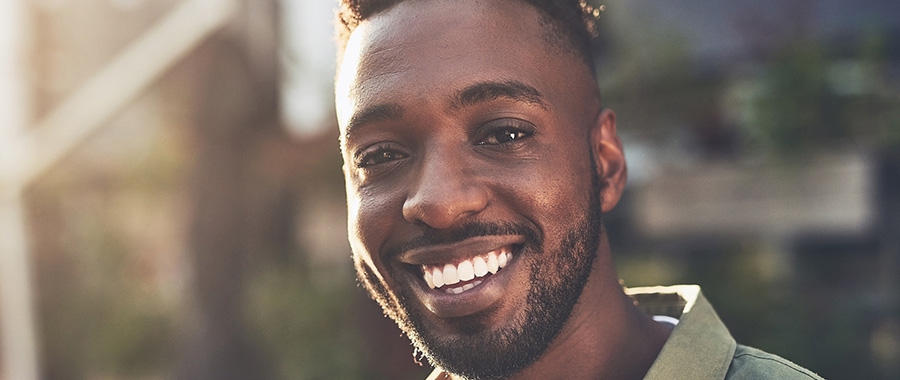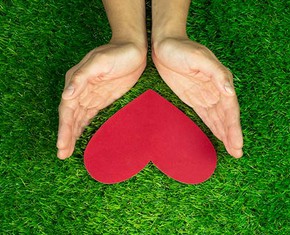The views expressed in our content reflect individual perspectives and do not represent the authoritative views of the Baha'i Faith.
The human face contains dozens of muscles, mostly controlled by the cranial nerve, which starts in the brainstem (as opposed to the spinal column). According to a source referenced on the science blog of HowStuffWorks, it takes 17 muscles to smile and 43 to frown, while another source cited there claims it takes up to 62 muscles to frown. By contracting and releasing our facial muscles, we are conveying information about our emotional state. Sometimes these muscle movements are interpreted correctly by others, and sometimes not.
Unless we’ve had neurological training on how to control our facial muscles, we typically convey our true feelings to others when we smile, frown or make other expressions. Smiling, frowning, raising an eyebrow, winking, and most other movements of our facial muscles are normally executed unconsciously, unless we want to convey a certain effect. Remember, too, that our facial expressions join with our words when we utter them—knowingly or unwittingly—either confirming or denying the veracity of what we say.
Indeed, for millennia, many proverbs and sayings have addressed the link between our faces and our inner state of being. For example, the expression “The eyes are the mirror of the soul” has been described as follows:
[This proverb means that] a person’s thoughts can be ascertained by looking in his or her eyes. The proverb has been traced back in English to “Regiment of Life.” But the proverb was known much earlier. Cicero (106-43 B.C.) is quoted as saying, “Ut imago est animi voltus sic indices oculi” (The face is a picture of the mind as the eyes are its interpreter). The Latin proverbs, “Vultus est index animi” or “Oculus animi index,” are usually translated as “The face is the index of the mind.” The French say, “Les yeux sont le miroir de l’dme” (The eyes are the mirror of the soul). “The eyes are the window of the soul” is a variant form of the proverb… – Gregory Y. Titelman, Random House Dictionary of Popular Proverbs and Sayings.
Mirrors of the Soul, a collection of Khalil Gibran’s writings, includes this quotation from him: “It were wiser to speak less of God, Whom we cannot understand, and more of each other, whom we may understand.”
All the studies show that we understand each other better face-to-face than we do through tweeting, Facebook posts or Instagram pictures, because our facial expressions and body language either cement the story we tell, or tell a different one. A selfie may capture a candid moment for posterity, or be posed and stiff, hiding the true emotions.
Our face is ours only. It’s how we stand distinguished within the ranks of humankind. And our soul—revealed through our face—is also uniquely our own. No one else has the same soul, no matter how close they are to us, in blood or in spirit.
So, then, with all of this in mind, what should we do with our face?
Baha’u’llah wrote:
Be generous in prosperity, and thankful in adversity. Be worthy of the trust of thy neighbor, and look upon him with a bright and friendly face. Be a treasure to the poor, an admonisher to the rich, an answerer to the cry of the needy, a preserver of the sanctity of thy pledge. Be fair in thy judgment, and guarded in thy speech. Be unjust to no man, and show all meekness to all men. Be as a lamp unto them that walk in darkness, a joy to the sorrowful, a sea for the thirsty, a haven for the distressed, an upholder and defender of the victim of oppression. Let integrity and uprightness distinguish all thine acts. – Gleanings from the Writings of Baha’u’llah, p. 285.
The second sentence of this beautiful passage is especially germane here. How different the world would be if everyone looked upon others, and upon life, with “a bright and friendly face!”
To me, looking at someone with a “bright face” signifies being positive and being aware that the other person is just as valuable as I am, has just as much to contribute, and deserves the chance to contribute.
Looking at others with a “friendly face” signifies my willingness to receive their contribution, to listen intently and to not dismiss it out of hand. It means being patient, kind, and forbearing—and indeed the rest of Baha’u’llah’s quotation above encourages us to be that way and more. We ought to consider each other as equals.
As I understand it, this spiritual principle—looking upon each other with a bright and friendly face—is part and parcel of a unique and practical Baha’i method for collective decision-making called “consultation.” Members of Baha’i governing councils and committees use it often, as do families and other groups. In consultation, the power of the group as a whole is greater than the sum of its parts. Consultation can take place between two or more people, and the Baha’i teachings say that it can be a panacea for domestic disputes—a powerful claim, considering a panacea is a never-failing cure:
Family consultation employing full and frank discussion, and animated by awareness of the need for moderation and balance, can be the panacea for domestic conflict. – Letter on behalf of the Universal House of Justice, August 1978, published in A Compilation on Women, p. 25.
As a municipal court mediator for 24 years, handling all sorts of monthly cases sent to our panel by the judge, I found that when both parties truly listened to the other, the dispute was almost always solved amicably. When one party held on to their stubborn opinion, agreement was nearly impossible.
True consultation requires that both parties have a pure motive, a sincere intention, to arrive at the truth of the matter. It requires honest and forthright expression on the part of all involved, so that each person can be heard and understood. Once one’s opinion is expressed clearly, one leaves the decision to the group and does not continually restate one’s view. Another Baha’i belief regarding consultation is that even if the wrong decision is made, it will be righted as long as that decision is made in unity. A related principle, so important today, is that all participants in the consultation support and act in accordance with the final decision—rather than take potshots at it or try to undermine it.
“A bright and friendly face,” your smile, engenders like responses in others. So let’s put our facial muscles to work.
















Comments
Sign in or create an account
Continue with Googleor